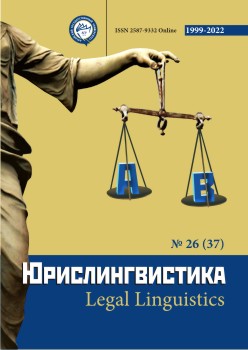On the Concept and Content of Sexual Freedom and Sexual Inviolability as Objects of Sexual Offences
УДК 343.54 ББК 67.408.113
Abstract
The article concentrates on the study of the content of the concepts of «sexual freedom» and «sexual inviolability» as objects of a group of crimes defined in Chapter 18 of the Criminal Code of the Russian Federation. Sexual freedom is described as a concept that has two aspects - freedom of self-determination and freedom from violence. As components of the freedom of self-determination in sexual relations, the following are proposed: the right to choose a sexual partner and the number of such, the types of sexual activities permissible for a given moment, time intervals and the place of having a sexual relation with a specific person or persons. The decision on the feasibility of such opportunities is valid at a particular moment in time and can be changed at any time at the will of the person. A new author's rationale has been proposed for recognizing sexual inviolability for several age groups of persons under 16 years of age, as well as for all persons in a helpless situation. Some contradictions between the norms of the family law and criminal legislation of the Russian Federation are noted, which can be overcome by their systematic interpretation in conjunction with each other. Arguments are proposed against criticism of the content of the explanatory note to Art. 134 of the Criminal Code of the Russian Federation. The signs for recognition of persons suffering from mental illness, as well as persons in an unconscious state with sexual inviolability are given. The issue of the object of sexual offences committed by homosexual acts is considered. The author proposes the concept of the advanced legal status of such acts based on a systematic analysis of the norms of the Criminal Code of the Russian Federation, the Code of Administrative Offenses of the Russian Federation and the position of the Constitutional Court of the Russian Federation.
Downloads
Metrics
References
Билалов Р.К. Брак по Уголовному кодексу / Законность. – 2010. – N 6. С. 41–42.
Гоноченко О.А., Пудовочкин Ю.Е. Защита несовершеннолетних от сексуального совращения и сексуальной эксплуатации: уголовно–правовые проблемы. Ставрополь, 2003.
Даль В.И. Толковый словарь живого русского языка Владимира Даля: подгот. по 2–му печ. изд. 1880–1882 гг. – Электрон. дан. М., 1998 – 1 электрон. опт. диск (CD–ROM).
Затона Р.Е. Уголовно–правовой и криминологический аспекты борьбы с ненасильственными сексуальными посягательствами на несовершеннолетних. Самара, 2003.
Нестеровская Ю.Л. Дискриминация по признаку сексуальной ориентации / Символ науки. – 2015. - № 3. – С. 158-159.
Озова Н.А. Насильственные действия сексуального характера. М., 2006.
Определение Конституционного Суда Российской Федерации от 21 октября 2008 года / СПС Консультант.
Постановление Конституционного Суда РФ от 23.09.2014 N 24-П «По делу о проверке конституционности части 1 статьи 6.21 Кодекса Российской Федерации об административных правонарушениях в связи с жалобой граждан Н.А. Алексеева, Я.Н. Евтушенко и Д.А. Исакова» / СПС Консультант.
Тыдыкова Н.В. Проблемы установления половой зрелости / Актуальные проблемы уголовного закона: сборник научных статей. - Барнаул, 2013. - С. 31-35.
Цэнгэл С.Д. Уголовная политика в сфере защиты половой неприкосновенности несовершеннолетних / Уголовная политика и проблемы правоприменения: сборник статей по материалам международной научно-практической конференции. - СПб, 2013. - С. 157-161.
Copyright (c) 2022 Надежда Тыдыкова

This work is licensed under a Creative Commons Attribution 4.0 International License.
The authors, which are published in this journal, agree to the following conditions:
1. Authors retain the copyright to the work and transfer to the journal the right of the first publication along with the work, at the same time licensing it under the terms of the Creative Commons Attribution License, which allows others to distribute this work with the obligatory indication of the authorship of this work and a link to the original publication in this journal .
2. The authors retain the right to enter into separate, additional contractual agreements for the non-exclusive distribution of the version of the work published by this journal (for example, to place it in the university depository or to publish it in a book), with reference to the original publication in this journal.
3. Authors are allowed to post their work on the Internet (for example, in a university repository or on their personal website) before and during the review process of this journal, as this may lead to a productive discussion, as well as more links to this published work (See The Effect of Open Access).











